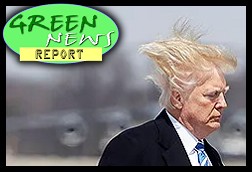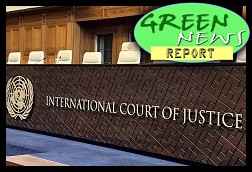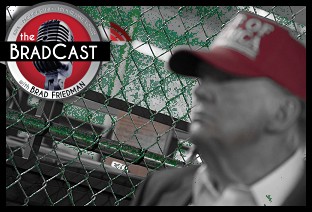 On today's BradCast: We are finally beginning to hear, at least from some in the media, about the unprecedented and nearly inconceivable depth of the crisis that coronavirus will wreak on both the lives of Americans and the U.S./world economy. But, for the moment, it's already wreaking havoc on the Presidential Primary election astonishingly still scheduled for this Tuesday in Wisconsin! And, in not unrelated news, employee health care plans, so zealously guarded during the peak of the Democratic Presidential Primary earlier this year, may have actually helped make the pandemic worse than it needed to be in the U.S. [Audio link to full show is posted at bottom of article.]
On today's BradCast: We are finally beginning to hear, at least from some in the media, about the unprecedented and nearly inconceivable depth of the crisis that coronavirus will wreak on both the lives of Americans and the U.S./world economy. But, for the moment, it's already wreaking havoc on the Presidential Primary election astonishingly still scheduled for this Tuesday in Wisconsin! And, in not unrelated news, employee health care plans, so zealously guarded during the peak of the Democratic Presidential Primary earlier this year, may have actually helped make the pandemic worse than it needed to be in the U.S. [Audio link to full show is posted at bottom of article.]
First up, Florida's mini-Trump Governor Ron DeSantis finally gave up the Fox "News" denial ghost on Wednesday and issued a statewide Stay-at-Home order for the Sunshine State. How many lives might have otherwise have been saved had he acted sooner, as health experts had been long imploring, remains to be seen.
But it's not only Republican Governors who appear in denial about the issue. Wisconsin's Democratic Gov. Tony Evers, while responsibly issuing a statewide Stay-at-Home order on March 24, has nonetheless been supportive of the state holding its Presidential Primary, statewide Supreme Court election and municipal contests as scheduled NEXT TUESDAY, on April 7, in the middle of a global pandemic! (Not to mention amid his own Stay-at-Home order!) While Evers says that only the Republican-majority legislature has the legal authority to postpone it or mandate an all-mail election, state GOPers have agreed with the Governor's plan to move forward as scheduled. The result is already catastrophic.
There is a massive shortage of poll workers across the state, with more than 100 communities having no poll workers at all as of yesterday, with an overall shortage of some 7,000 workers in 60% of the state's municipalities. Evers has now called in the National Guard to work the polls, but it appears to be too little too late. The matter now comes down to the decision of a federal judge as to whether to postpone or not, as the Wisconsin Election Commission argues that large numbers of absentee ballots may never arrive in time for voters, and might never be counted at all, due to a simultaneous deluge of incoming absentee ballots that officials appear wildly unprepared to handle.
I only hope that the more than twenty states which have postponed their primaries (somewhat optimistically) to May or June are taking note of the ongoing meltdown in the Badger State, and that all 50 states get to work NOW to figure out how to safely, transparently and accurately manage the likely need for Vote-by-Mail elections across the nation for the never-more-critical Presidential election on November 3rd.
As we have been trying to underscore in recent days, the effect of the novel coronavirus is likely to be far more extensive --- both medically and economically --- than almost anybody has been discussing out loud, especially our national leaders and the media. Donald Trump and his White House have, of course, been in criminally obscene denial from the jump, but members of Congress and even presumptive Democratic Presidential Nominee Joe Biden have not been much better at telling the truth to the American people about how deeply devastating this crisis is going to be to the economy and how long it is likely to continue.
Today, the New York Times finally began doing so, a bit, in two different articles. One from Jim Tankersley reveals that top White House economists on the National Security Counsel warned about exactly this scenario in a study published last September, long before Trump and his public-facing economic team repeatedly lied to the media about the virus being under control and no threat to the economy. The other Times piece, from reporter Peter Goodman, details how the economic downturn is likely to continue "into next year, and even beyond" and why the almost certainly lengthy "abrupt halt of commercial activity threatens to impose economic pain" that could take years to recover from in what is shaping up to be "a financial crisis of cataclysmic proportions". One result, according to a recent analysis by the St. Louis Fed, is that as many as 47 million Americans could find themselves unemployed soon. (That amounts to an approximately 32% jobless rate, compared to 25% during the Great Depression and 10% in the 2008 Great Recession.)
So, how are those employer-based health care plans looking right about now for millions of Americans who have already or are about to lose both their jobs AND their health care insurance? At the height of the still-ongoing Democratic Primary, the case was made by candidates like Joe Biden and Pete Buttigeig and Amy Klobuchar that such plans were just too good for Americans to give up in favor of a single-payer, government-funded, cradle-to-grave, Medical-for-All type plan, like that proposed by Bernie Sanders and Elizabeth Warren. But our guest today, former healthcare insurance executive turned political columnist and host of The Zero Hour, RICHARD 'RJ' ESKOW, argues at The American Prospect that the structure of many of those employer-based plans --- and the way most such coverage has been structured since the 1980s in the U.S. --- may have resulted in the pandemic's spread being worse than it might otherwise have been in this country, were it not for "a plot twist worthy of H.G. Wells".
Eskow explains how the timing of the viral spread in the U.S. --- at the beginning of the year, instead of year's end, after costly deductibles may have already been covered by many --- might have prevented thousands from seeking care earlier.
"You have 70%, according to polls, of Americans saying they don't have $1000 on hand for an emergency, and you have deductibles on average that are higher than that," he says. "Most people don't meet their deductibles in the first quarter of the year. The pandemic struck in the first quarter of the year. They literally have to pay 100% out-of-pocket at this point. Maybe they'll get reimbursed someday, but remember, they don't have the cash on hand. So we have a situation where people almost certainly are not getting checked out as quickly as they should be, which is promoting the spread of the disease and worsening the progression of the disease for people who have it."
He also details how the cost-sharing structures of most "health benefit plans" --- requiring co-pays, deductibles, premiums and other out-of-pocket "cost sharing" expenses, as implemented by employers and health insurance companies to actually discourage care-seeking ("skin in the game", as many have referred to the concept over recent decades) --- has further helped to unnecessarily worsen the crisis in a way that a Medicare-for-All styled system might have helped to avoid.
Eskow, who served as a Senior Writer and Editor for Sanders' 2016 Presidential campaign, also discusses what effect, if any, all of this may be having on the Vermont Senator's insistence on remaining in the race until a nominee is officially chosen, somehow, at some version of a Democratic National Convention this year...
(Snail mail support to "Brad Friedman, 7095 Hollywood Blvd., #594 Los Angeles, CA 90028" always welcome too!)
|


 A Pu Pu Platter of Trump Corruption: 'BradCast' 7/29/25
A Pu Pu Platter of Trump Corruption: 'BradCast' 7/29/25  'Green News Report' 7/29/25
'Green News Report' 7/29/25
 GOP Cuts to Medicaid, Medicare, ACA Could Trigger 'Catastrophic' Crisis This Fall: 'BradCast' 7/28/25
GOP Cuts to Medicaid, Medicare, ACA Could Trigger 'Catastrophic' Crisis This Fall: 'BradCast' 7/28/25 Sunday 'Pedo Files' Toons
Sunday 'Pedo Files' Toons Landmark Climate Ruling at World Court; More Epstein Trouble for Petty Little Tyrant: 'BradCast' 7/24/25
Landmark Climate Ruling at World Court; More Epstein Trouble for Petty Little Tyrant: 'BradCast' 7/24/25 'Green News Report' 7/24/25
'Green News Report' 7/24/25 Trump's Epstein 'Conspiracy Machine Not Going Away': 'BradCast' 7/23/25
Trump's Epstein 'Conspiracy Machine Not Going Away': 'BradCast' 7/23/25 Dems Unlikely to Counter GOP's TX Redistricting Scheme: 'BradCast' 7/22/25
Dems Unlikely to Counter GOP's TX Redistricting Scheme: 'BradCast' 7/22/25 'Green News Report' 7/22/25
'Green News Report' 7/22/25 Not a Drill!: Trump Gutting News Media, Press Freedoms: 'BradCast' 7/21/25
Not a Drill!: Trump Gutting News Media, Press Freedoms: 'BradCast' 7/21/25 Sunday 'Wonderful Secret' Toons
Sunday 'Wonderful Secret' Toons 'Green News Report' 7/17/25
'Green News Report' 7/17/25 CO Election Clerks Block Vote System Breach: 'BradCast' 7/17/25
CO Election Clerks Block Vote System Breach: 'BradCast' 7/17/25 'Superman is Story of America'. No Wonder MAGA Hates Him: 'BradCast' 7/16/25
'Superman is Story of America'. No Wonder MAGA Hates Him: 'BradCast' 7/16/25  Trump IRS: Churches May Endorse. (Are All Nonprofits Next?): 'BradCast' 7/15/25
Trump IRS: Churches May Endorse. (Are All Nonprofits Next?): 'BradCast' 7/15/25 Support for Immigrants Skyrockets Amid Trump's Crackdown: 'BradCast' 7/14/25
Support for Immigrants Skyrockets Amid Trump's Crackdown: 'BradCast' 7/14/25  Democracy STILL Our Best Way Out of This -- And Repubs Know It: 'BradCast' 7/10/25
Democracy STILL Our Best Way Out of This -- And Repubs Know It: 'BradCast' 7/10/25 'Mass Shooter Subsidy'?: More Dumb, Deadly Stuff in Trump's New Law: 'BradCast' 7/9/25
'Mass Shooter Subsidy'?: More Dumb, Deadly Stuff in Trump's New Law: 'BradCast' 7/9/25  Trump's New Law Supersizes ICE, Mass Detention: 'BradCast' 7/8/25
Trump's New Law Supersizes ICE, Mass Detention: 'BradCast' 7/8/25 Texas Flooding Tragedy Was Both Predictable and Predicted: 'BradCast' 7/7/25
Texas Flooding Tragedy Was Both Predictable and Predicted: 'BradCast' 7/7/25
 VA GOP VOTER REG FRAUDSTER OFF HOOK
VA GOP VOTER REG FRAUDSTER OFF HOOK Criminal GOP Voter Registration Fraud Probe Expanding in VA
Criminal GOP Voter Registration Fraud Probe Expanding in VA DOJ PROBE SOUGHT AFTER VA ARREST
DOJ PROBE SOUGHT AFTER VA ARREST Arrest in VA: GOP Voter Reg Scandal Widens
Arrest in VA: GOP Voter Reg Scandal Widens ALL TOGETHER: ROVE, SPROUL, KOCHS, RNC
ALL TOGETHER: ROVE, SPROUL, KOCHS, RNC LATimes: RNC's 'Fired' Sproul Working for Repubs in 'as Many as 30 States'
LATimes: RNC's 'Fired' Sproul Working for Repubs in 'as Many as 30 States' 'Fired' Sproul Group 'Cloned', Still Working for Republicans in At Least 10 States
'Fired' Sproul Group 'Cloned', Still Working for Republicans in At Least 10 States FINALLY: FOX ON GOP REG FRAUD SCANDAL
FINALLY: FOX ON GOP REG FRAUD SCANDAL COLORADO FOLLOWS FLORIDA WITH GOP CRIMINAL INVESTIGATION
COLORADO FOLLOWS FLORIDA WITH GOP CRIMINAL INVESTIGATION CRIMINAL PROBE LAUNCHED INTO GOP VOTER REGISTRATION FRAUD SCANDAL IN FL
CRIMINAL PROBE LAUNCHED INTO GOP VOTER REGISTRATION FRAUD SCANDAL IN FL Brad Breaks PA Photo ID & GOP Registration Fraud Scandal News on Hartmann TV
Brad Breaks PA Photo ID & GOP Registration Fraud Scandal News on Hartmann TV  CAUGHT ON TAPE: COORDINATED NATIONWIDE GOP VOTER REG SCAM
CAUGHT ON TAPE: COORDINATED NATIONWIDE GOP VOTER REG SCAM CRIMINAL ELECTION FRAUD COMPLAINT FILED AGAINST GOP 'FRAUD' FIRM
CRIMINAL ELECTION FRAUD COMPLAINT FILED AGAINST GOP 'FRAUD' FIRM RICK SCOTT GETS ROLLED IN GOP REGISTRATION FRAUD SCANDAL
RICK SCOTT GETS ROLLED IN GOP REGISTRATION FRAUD SCANDAL VIDEO: Brad Breaks GOP Reg Fraud Scandal on Hartmann TV
VIDEO: Brad Breaks GOP Reg Fraud Scandal on Hartmann TV RNC FIRES NATIONAL VOTER REGISTRATION FIRM FOR FRAUD
RNC FIRES NATIONAL VOTER REGISTRATION FIRM FOR FRAUD EXCLUSIVE: Intvw w/ FL Official Who First Discovered GOP Reg Fraud
EXCLUSIVE: Intvw w/ FL Official Who First Discovered GOP Reg Fraud GOP REGISTRATION FRAUD FOUND IN FL
GOP REGISTRATION FRAUD FOUND IN FL

































